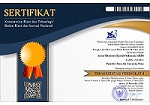Effect of Performance Expectations, Effort Expectations, Social Influence, and Facilitation Conditions on Behavioral Intentions in Sharia Entrepreneurship
Abstract
Keywords
Full Text:
PDFReferences
Bhatti, Anam, Hamza Akram, Hafiz Muhammad
Basit, Ahmed Usman Khan, Syeda
Mahwish Raza, and Muhammad Bilal
Naqvi. 2020. “E-Commerce Trends during
COVID-19 Pandemic.” International Journal
of Future Generation Communication and
Networking 13(2):1449–52.
Chrismastuti, Agnes Advensia, Robertus
Setyawan Aji Nugroho, Alexandra Adriani,
Vena Purnamasari, And Stephana Dyah A.
Y. U. Ratnaningsih. 2019. “Accounting
Software for MSMEs: Organizational and
Personal Fowners Based on TAM Theory.”
South East Asia Journal of Contemporary
Business, Economics and Law 19(1):1–7.
Febriyani, Kiki, and Dwi Suprajitno. 2020.
“Analisis Pengaruh Technology Acceptance
Model (TAM) Pada Penggunaan Sistem
Keuangan Desa.” Jurnal Ilmiah Mahasiswa
Manajemen, Bisnis Dan Akuntansi (JIMMBA)
(4):515–28.
Fedorko, Igor, Radovan Bačik, and Beata
Gavurova. 2021. “Effort Expectancy and
Social Influence Fowners as Main
Determinants of Performance Expectancy
Using Electronic Banking.” Banks and Bank
Systems 16(2):27.
Firdaus, Rahmad, S. Kel, Sapta Aji Sri
Margiutomo, S. Kom, Irma Maria Dulame,
M. M. SE, S. E. Dwi Hastuti, S. T.
Yulhendri, S. T. Okma Yendri, and S. E.
Bayu. 2023. Tren Bisnis Digital (Optimasi &
Optimalisasi Usaha Berbasis Digitalisasi).
Efitra, S. Kom., M. Kom.
Hamzat, Saheed Abiola, and Iyabo Mabawonku.
“Influence of Performance
Expectancy and Facilitating Conditions on
Use of Digital Library by Engineering
Lecturers in Universities in South-West,
Nigeria.” Library Philosophy and Practice 1–16.
Handayani, Trie, and Sudiana Sudiana. 2015.
“Analisis Penerapan Model UTAUT
(Unified Theory of Acceptance and Use of
Technology) Terhadap Perilaku Pengguna
Sistem Informasi (Studi Kasus: Sistem
Informasi Akademik Pada STTNAS
Yogyakarta).” Angkasa: Jurnal Ilmiah Bidang
Teknologi 7(2):165–80.
Hartati, Ery. 2017. “Analisis Sistem Penerapan
E-Learning Dengan Menggunakan Metode
Utaut (Unified Theory Of Acceptanced Use
Of Technolog)(Study Kasus: Stmik Xyz).”
Jurnal Informatika Global 8(1).
Iriyadi, Iriyadi, Muhammad Ardhi Maulana, and
Yayuk Nurjanah. 2018. “Financial
Reporting for Micro Small and Medium
Enterprises Towards Industrial Revolution
Era 4.0.” Pp. 32–38 in International Conference
On Accounting And Management Science 2018.
Istiarni, Panggih Rizki Dwi, and P. Basuki
Hadiprajitno. 2014. “Analisis Pengaruh
Persepsi Manfaat, Kemudahan Penggunaan
Dan Kredibilitas Terhadap Minat
Penggunaan Berulang Internet Banking
Dengan Sikap Penggunaan Sebagai Variabel
Intervening (Studi Empiris: Nasabah
Layanan Internet Banking Di Indonesia).”
Diponegoro Journal of Accounting 3(2):888–97.
Kanthi, Yekti Asmoro, Arif Tirtana, and Muhadi
Aan Sulistiyo. 2022. “Analysis Of The
Application Of The UTAUT Model In
Understanding The Acceptance And Use
Of OVO Applications In Malang City.”
Procedia of Social Sciences and Humanities
:334–42.
Latifah, Lyna, Doddy Setiawan, Y. Anni Aryani,
and Rahmawati Rahmawati. 2021.
“Business Strategy–MSMEs’ Performance
Relationship: Innovation and Accounting
Information System as Mediators.” Journal of
Small Business and Enterprise Development
(1):1–21.
Lee, Yong-Jun, and Won-Je Kim. 2021. “A
Study on Fowners Affecting OTT Users’
Intention to Continue Using Curation
Services.” Journal of Digital Convergence
(4):217–25.
Lestari, Kurnia Cahya, and Arni Muarifah Amri.
Sistem Informasi Akuntansi (Beserta
Contoh Penerapan Aplikasi SIA Sederhana
Dalam UMKM). Deepublish.
Mahardika, Putu Chandra, and IGAK Giantari.
“The Effect of Behavioural Intention
and Perceived Risk to Adopt Mobile
Banking Using UTAUT Model (Study at
BPD Bali Klungkung Branch in Semarapura
City).” American International Journal of
Business Management 3(10):106–15.
Mura, Ladislav, Aleksandr Ključnikov, Manuela
Tvaronavičienė, and Armenia
Androniceanu. 2017. “Development
Trends in Human Resource Management in
Small and Medium Enterprises in the
Visegrad Group.” Acta Polytechnica Hungarica
(7):105–22.
Mustika, Sena Satria. 2018. “Faktor-Faktor Yang
Mempengaruhi Minat Penggunaan Aplikasi
Sistem Keuangan Desa (SISKEUDES):
Model Decomposed Theory Of Planned
Behavior.”
Nugraha, Derri Benarli, Zul Azmi, Siska Yulia
Defitri, Johni S. Pasaribu, Lesi Hertati,
Endra Saputra, Rusydi Fauzan, Meifida
Ilyas, Adhi Alfian, and Samanoi Halowo
Fau. 2023. Sistem Informasi Akuntansi. Global
Eksekutif Teknologi.
Putra, Yananto Mihadi. 2019. “Analysis of
Fowners Affecting the Interests of SMEs
Using Accounting Applications.” Journal of
Economics and Business 2(3).
Raditya, Vieridho Rafif, Dona Primasari, and
Rini Widianingsih. 2020. “Analisis
Penggunaan Teknologi Aplikasi Akuntansi
Pada Usaha Kecil Dan Menengah (UKM)
Di Kabupaten Banyumas Melalui
Pendekatan Technology Acceptance….” J.
Ris. Akunt. Soedirman 1(1).
Rema, Yasinta Oktaviana L., and Djoko
Budianto Setyohadi. 2016. “Faktor-Faktor
Yang Mempengaruhi Penerimaan Mobile
Banking Studi Kasus: BRI Cabang Bajawa.”
Pp. 114–22 in Seminar Riset Teknologi
Informasi.
Rukmiyati, Ni Made Sri, and I. Ketut Budiartha.
“Pengaruh Kualitas Sistem Informasi,
Kualitas Informasi Dan Perceived
Usefulness Pada Kepuasan Pengguna Akhir
Software Akuntansi (Studi Empiris Pada
Hotel Berbintang Di Provinsi Bali).” EJurnal Ekonomi Dan Bisnis Universitas Udayana
(1):115–42.
Setyowati, Elisabeth Octaviana Tri, and Agustini
Dyah Respati. 2017. “Persepsi Kemudahan
Penggunaan, Persepsi Manfaat, Computer
Self Efficacy, Dan Kepuasan Pengguna
Sistem Informasi Akuntansi.” Jurnal Riset
Akuntansi Dan Keuangan 13(1):63–75.
Setyowati, Widhy, Riya Widayanti, and Dedeh
Supriyanti. 2021. “Implementation Of EBusiness Information System In Indonesia:
Prospects And Challenges.” International
Journal of Cyber and IT Service Management
(2):180–88.
Taherdoost, Hamed. 2018. “A Review of
Technology Acceptance and Adoption
Models and Theories.” Procedia
Manufacturing 22:960–67.
Venkatesh, Viswanath, and Xiaojun Zhang.
“Unified Theory of Acceptance and
Use of Technology: US vs. China.” Journal of
Global Information Technology Management
(1):5–27.
Williams, Michael D., Nripendra P. Rana, and
Yogesh K. Dwivedi. 2015. “The Unified
Theory of Acceptance and Use of
Technology (UTAUT): A Literature
Review.” Journal of Enterprise Information
Management 28(3):443–88.
Zaelani, Iwan Ridwan. 2019. “Peningkatan Daya
Saing UMKM Indonesia: Tantangan Dan
Peluang Pengembangan IPTEK.” Jurnal
Transborders 3(1):15
DOI: http://dx.doi.org/10.21927/jesi.2023.13(2).170-182

This work is licensed under a Creative Commons Attribution-ShareAlike 4.0 International License.












